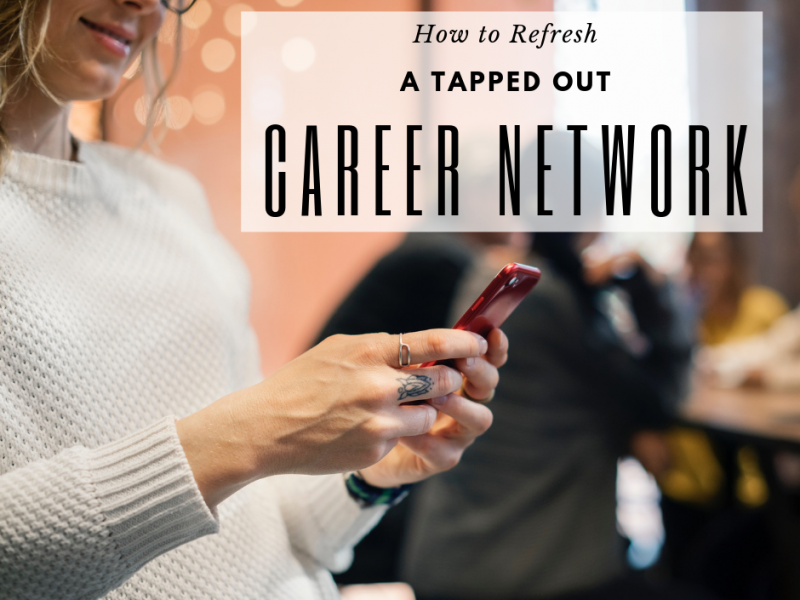A solid networking strategy is the best way to land a job quick. Without your network, you will be competing against hundreds of candidates for jobs. You will also be up against ATS-systems designed to send your resume to the trash. Therefore, focus on networking to generate foot-in-the-door opportunities at your dream company. But what happens when your network is completely tapped out? What happens when you have contacted everyone you know? In this post we’ll share different strategies for generating new networking contacts. We’ll also share some ideas for how to refresh your existing network.
You might not be achieving your full networking capacity
In my experience coaching hundreds of job seekers, I’ve learned that even the most seasoned networkers only network at half capacity. This is one of the top job search mistakes. The average job seeker gets distracted by online job boards. This is not networking strategy. Online surfing for jobs is actually the worst strategy you could use to land a job. So it’s no wonder that most job seekers feel like they have completely tapped their networks. We’ve all been there; that feeling of the totally tapped-out network. After all, we can only know so many people and those people can only do so much to help. Right? Not entirely. Sure you may not be getting the desired results from the folks you’ve contacted, but that doesn’t mean your network is totally dried up.
The best way to network and land a job quicker
Networking can mean a lot of things to a lot of people. There is online networking and offline networking. Online networking is great but it is certainly no substitute for offline networking. In fact, online networking without offline networking, doesn’t work. The reason offline networking is superior, and has the potential to produce results quicker is this: people hire people they like. I can guarantee that you will sell yourself better with a smile and some intelligent questions over coffee. This is a far more effective sell than your resume. If you haven’t committed to networking in the truest sense of the word, then I’d encourage you to rip off the band-aid and go for it! Your network isn’t tapped out. You may just need to change your approach and actually commit to networking. My clients who get out from behind their computers and network, reach success quicker than those who don’t.
One proven networking strategy for in-person networking
Informational interviews can be a great way to get a foot in the door at a company you’re targeting. Many of my high-achieving clients use informational interviews as part of an accelerated networking strategy. Informational interviews work because they generate interviews and job offers. Becoming proficient in scheduling and conducting informational interviews is a powerful skill you can use your entire career. Informational interviews might sound intimidating but they tend to be relaxed Q&A style meetings. I find that the format actually helps to get both parties talking. This will almost immediately take the pressure out of the networking conversation.
How to engage your current network starting with old contacts
If you’re new to informational interviewing, a great place to start is with people you know. In executive recruiting I learned that it’s always a good idea to engage your contacts every 6 months. Time passes with the blink of an eye. You’d be amazed at how a year or two may pass without having made contact with your network. It’s always a much-needed reality check when I receive a “just checking in” message from an old contact. It’s refreshing! It’s also a great opportunity to network. Remember: networking is all about building relationships. An authentic “check in” or coffee goes a long way in whether or not someone might be willing to help you down the line. And of course if you are in your job search, a coffee catch up is one way for you to get back on your contact’s radar. You never know how people are connected. Your known connections may just know the perfect contact to help you get a foot in the door.
Your network is bigger than you think. You just need to find more useful contacts.
First, commit to networking with your old contacts. Next, start reaching out to your old contacts to schedule meetings. Once you start engaging your current network, and practicing your informational interviews, you’ll start to become more comfortable networking. You can then continue to network with existing contacts quite easily. It’s a matter of outreach and scheduling. It will practically run on auto-pilot! You might be thinking that you don’t know that many people. I challenge you to wipe that thought from your head. You don’t have to know people who are in the exact company or space you’re targeting. Just start meeting with people whom you know in general. Great starter contacts are: past colleagues, your college alumni network, former professors, family, friends, – it’s quite easy! Again, you never know who they may know.
Download Noelle’s Favorite 9 Networking Outreach LinkedIn Messaging Templates Now!
Start expanding your network beyond existing contacts
When you start networking with your existing contacts, you will find that you are being introduced to new contacts from their networks. This is one purpose of networking – to receive introductions to new contacts from people you know. This is the easiest way to connect with people outside your network – to receive an introduction from your existing contact. However, you should also be building a brand new network based on your company or role target. Spend some time reviewing your LinkedIn network. You may find that some of your existing contacts are connected to people at your dream company. In this sense, your network will start to really expand. The possibilities are nearly endless!
How to use LinkedIn to find new contacts and make contact
Use LinkedIn for targeted research. This is how you find high-value networking contacts. Search all the contacts within your target companies. You also want to search people who have a similar role to the one you’re targeting (not necessarily inside your dream companies). This will help you expand your network even more. When you find people with whom you’d like to meet, make contact. You can do this one of two ways. Find out if you have any common connections with this new contact. If so, ask your common connection to make an introduction. If you do not have common connections, you will need to make cold outreach. You can do this in the form of a LinkedIn message, email, or cold call. (Cold calling will work best FYI).
Expand your network beyond the traditional networking venues
Another lighter networking approach, is that of meeting people with similar interests. It’s easy to find common ground with someone who shares your interests – and therefore much easier to gain the trust needed for a professional introduction. If you’re in need of a break from the more professional networking venues, try a meetup based on your hobbies/interests. Meetups have become a popular way to connect with others locally on a variety of different topics. You could focus on groups for job seekers in your city if you are at that stage OR industry-specific groups. Even recreational interest groups are a great way to meet new contacts and build new relationships based on common interests. People hire people they like and if you are meeting people who like the same things as you, it’s kind of a no-brainer in terms of passing the like-ability test!
If you’re from a smaller community where Meetup may not have a presence, there are other ways to find interest groups. Search your local paper. Attend your church’s groups/events. Volunteer for local non-profits or community festivals. I know many people who were able to turn volunteering into a new job. Small communities usually are usually closer-knit and may therefore have ample opportunities to get out and be around other well-respected individuals.
Build your recruiter network
Another way to expand your network without leaving your home is to connect with as many recruiters as you can, from your industry. This might sound like an exercise in futility but the truth is recruiters are incredibly well-networked. If you are on the radar of many recruiters, you won’t be forgotten when the right opportunity comes up. Just a word of warning – there are tons of recruiters out there so stick to your industry. Searching for and finding the right recruiters is quite simple. A great place to start is by joining recruiter groups on LinkedIn. You don’t want to limit the number of recruiters with whom you are connected. So in that sense, your recruiter networking won’t be tapped out any time soon. If you’re an executive, you need to be connected with Executive Recruiters.
If you struggle with recruiters, I don’t blame you. Recruiters have a reputation for not returning phone calls. However, I’d encourage you to do away with that mindset. It’s all about timing with recruiters. If you’re the right fit, at the right time, you’ll be glad for the connection!



 10 Resume Writing Tips to Make Your Job Search Easier
10 Resume Writing Tips to Make Your Job Search Easier


